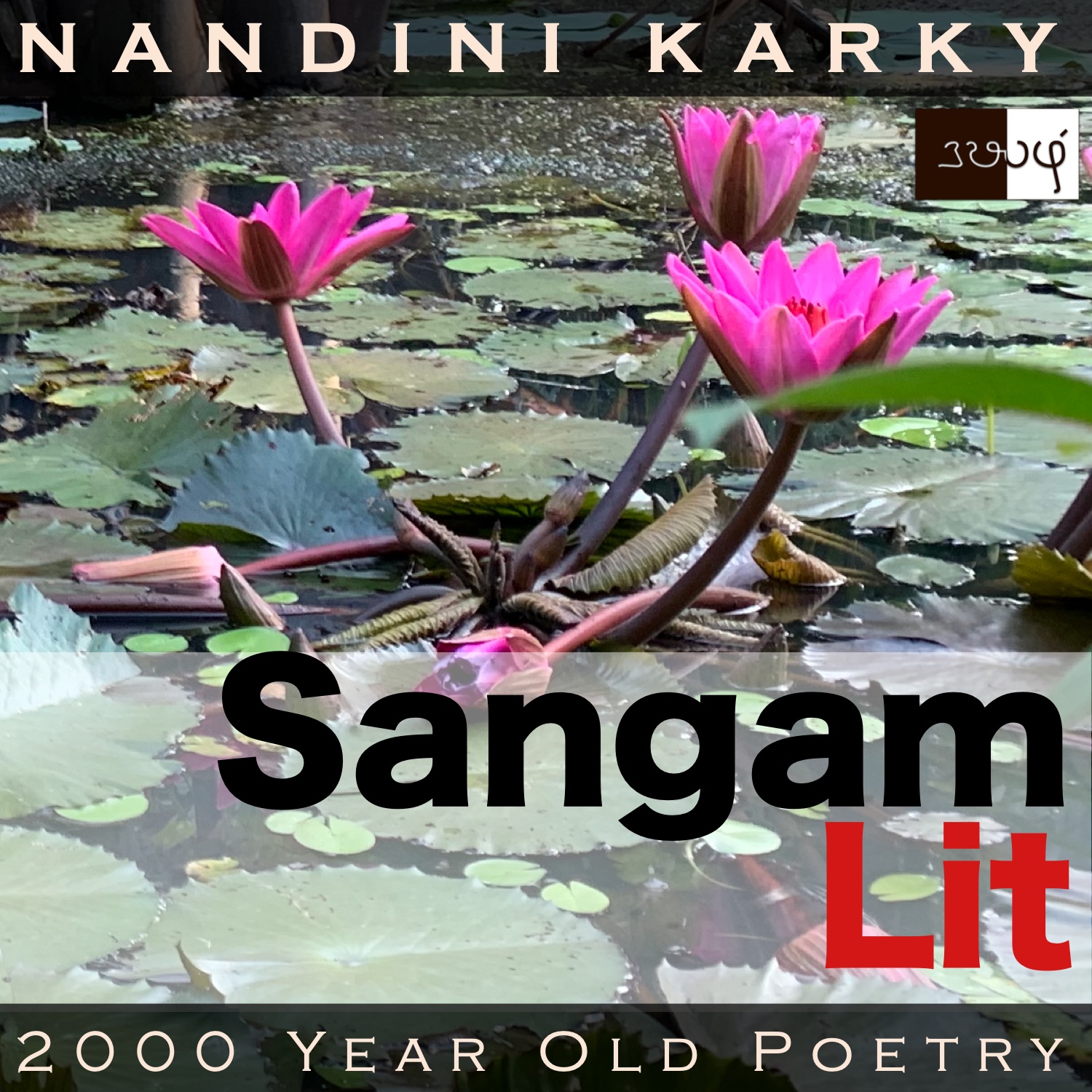Podcast: Play in new window | Download
Subscribe: Apple Podcasts | Spotify | Amazon Music | Android | iHeartRadio | TuneIn | RSS | More

In this episode, we perceive the art of allaying anxiety, as depicted in Sangam Literary work, Kurunthogai 59, penned by Mosikeeranaar. The verse is situated in the drylands of ‘Paalai’ and speaks in the voice of the confidante to the lady, consoling her friend as she worries about the man’s parting away.
பதலைப் பாணிப் பரிசிலர் கோமான்
அதலைக் குன்றத்து அகல் வாய்க் குண்டு சுனைக்
குவளையொடு பொதிந்த குளவி நாறு நின்
நறு நுதல் மறப்பரோ-மற்றே; முயலவும்,
சுரம் பல விலங்கிய அரும் பொருள்
நிரம்பா ஆகலின், நீடலோ இன்றே.
On one side, there’s lush beauty and on the other, parched paths towards wealth! Even as it opens, the verse talks about a specific type of drum used by ancient Tamils called as ‘பதலை’. The phrase ‘பரிசிலர் கோமான்’ brings together the ‘supplicants and the patron’ and refers to an ancient ruler, a benefactor of the arts. Kindling the interest of travel enthusiasts, appears ‘அதலைக் குன்றம்’, hills, possibly in the eastern ghats, which some scholars locate in the Salem district of Tamilnadu. Moving on, we delight in the ‘குண்டு சுனைக் குவளை’ referring to ‘the blue lilies blooming in the deep waters of a spring’ as well as ‘குளவி’ referring to ‘wild jasmines’. After being bathed in the fragrance of these flowers, we turn in the opposite direction and journey towards ‘that hard-to-find wealth beyond deserts many’ in ‘சுரம் பல விலங்கிய அரும் பொருள்’. Ending with the promise ‘நீடலோ இன்றே’ meaning ‘there will be no prolonging’, the verse invites us within!
Freshness of flowers and fading wealth characterise this rendition. The context reveals that the man and lady had been leading a happy married life when the man went in search of wealth. At this time, the lady languished in his absence. Perceiving her friend’s worried state, the confidante says to the lady, “In the ‘athalai hills’, ruled by the generous king, who is the patron of musicians wielding ‘pathalai’ drums, amidst the wide-mouthed, deep springs, blooms blue lilies. The scent of those blue lilies intermingled with wild jasmines arises from your fragrant forehead. How could he ever forget that? Also, even with great effort and travel through many a drylands path, that elusive wealth cannot be obtained entirely and so, he will not delay his return!” With these words, the confidante assures the lady that the man would be with her soon.
What is the core in the confidante’s assurance? She begins by evoking the sound of ‘pathalai’ drums and points to musicians, who are adept at playing it. If you are an artist, you sure need a patron and it’s this patron, the confidante mentions as the generous king, who rules over the ‘Athalai hills’. Having transported the listener to that king’s domain, the confidante then proceeds to go deeper therein and takes us to a spot near the water-filled, lush springs that have a wide periphery and a deep floor. On this symbol of nature’s prosperity, blooms the glowing petals of blue lilies. Plucking those blue lilies, the confidante then heads to the wild jasmines dancing around. She then hands over a garland of these two flowers and invites us to take a whiff of their fragrance. This entire exercise has been to make us realise the fragrance of the lady’s forehead. Then, she turns with a smile to the lady and says, how could the man ever forget your fragrance-filled, delicate forehead!
As if just the praise of the lady’s beauty was not enough, the confidante adds another abstract dimension, turning to talk about wealth. She describes how no matter how hard one tries and no matter how many deserts and drylands one crosses, wealth is something that can never be obtained completely. Knowing this, the man would not delay his journey, the confidante says with conviction. Let’s dwell on this perfect capture of the nature of wealth! The confidante seems to say one can never have enough of wealth, meaning that there’s no end to that search. One, it’s something rare and the other, that the human mind finds it hard to be satisfied in that regard. But, pointing to how the man was aware of these truths, the confidante says he would not unnecessarily keep continuing a journey which has no end and thus, provides that persuasive consolation to the lady. In one of those rare coincidences, just this morning, in one of my newsletters, I glimpsed at the title ‘How to comfort someone’, which turned out to be a podcast episode by a psychologist, relating on how to provide a compassionate response to our loved ones. As I read and reflected on this verse, I smiled to think how well the Sangam confidante fulfils this role in her thoughtful and caring words to the lady. Here’s a wish to have a friend like that, or better still, be a friend like that to someone!




Share your thoughts...